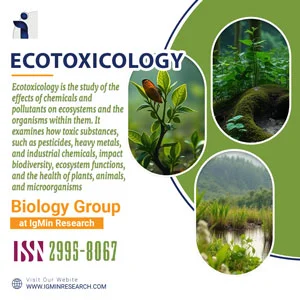About
Advancing Research in Ecotoxicology
Ecotoxicology plays a vital role in understanding the impact of pollutants on ecosystems, wildlife, and human health. At IgMin Research, we provide a robust platform for ecotoxicology journal submission, welcoming interdisciplinary studies that address chemical, biological, and ecological interactions in contaminated environments.
We encourage scientists and researchers to submit ecotoxicology research that explores toxicity mechanisms, environmental risk assessments, and mitigation strategies. Our editorial team ensures fast, fair peer review to promote timely dissemination of high-quality findings.
Why Choose IgMin Research for Your Ecotoxicology Work?
- Quick Submission Portal — Share your manuscript swiftly and efficiently.
- Ecotoxicology Publishing Guidelines — Ensure your manuscript aligns with our editorial standards.
- Submit Your Ecotoxicology Study — Upload full manuscripts with ease through our streamlined platform.
At IgMin Research, our mission is to support scientists tackling pressing environmental challenges. Publish with us and contribute to a safer, more sustainable future.
Editors

Why publish with us?
Global Visibility – Indexed in major databases
Fast Peer Review – Decision within 14–21 days
Open Access – Maximize readership and citation
Multidisciplinary Scope – Biology, Medicine and Engineering
Editorial Board Excellence – Global experts involved
University Library Indexing – Via OCLC
Permanent Archiving – CrossRef DOI
APC – Affordable APCs with discounts
Citation – High Citation Potential
Which articles are now trending?
Research Articles
- Unraveling Cognitive Aging: A Comprehensive Narrative Review of the Seattle Longitudinal Study and Recent Breakthroughs
- Enhancing Material Property Predictions through Optimized KNN Imputation and Deep Neural Network Modeling
- Adaptation of the Physical Literacy Scale for Adults into Turkish and Examination of its Psychometric Properties
- Lunar-Derived Propellants for Fueling Mars-Bound Spacecraft in Cis-Lunar Space
- Melanocytic Nevi Classification using Transfer Learning
- A Model of the Enforcement of Laws in Tramadol Drug Abusers
Advertisement












